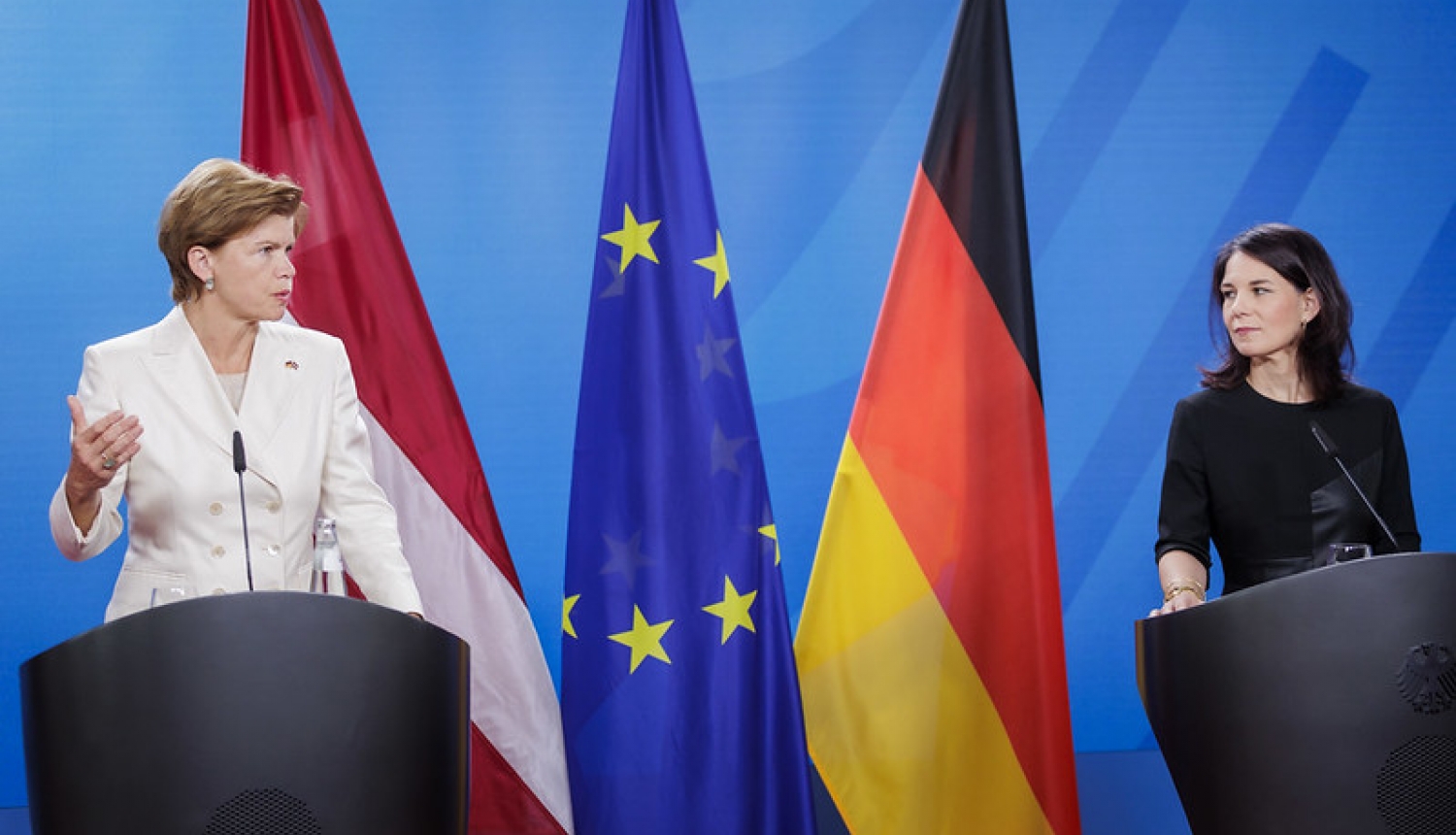On 1 July 2024 in Berlin, the Minister of Foreign Affairs, Baiba Braže, had a discussion with the German Federal Minister for Foreign Affairs, Annalena Baerbock, on bilateral cooperation between the two countries in security and economic matters, and their work together in the EU and NATO. In the context of current developments in Ukraine, the two officials are of the same opinion: work should continue on support to Ukraine and on holding Russia accountable in all the international formats available.
In a discussion on security matters, Baiba Braže thanked Annalena Baerbock for Germany's important contribution to the defence of countries on NATO’s border and the security of the EU’s eastern flank. The Minister welcomed Germany's leadership as the framework nation of NATO’s enhanced presence multinational battle group in Lithuania – this is important in order to deter Russia in the long term. Baiba Braže also emphasised that the Baltic Air Policing mission carried out by Germany in Lielvārde will contribute significantly to NATO’s deterrence and defence capabilities. The Ministers agreed on the need to boost the capacity of the EU military industry, including through developing the next multi-annual EU budget in the context of EU reforms and EU enlargement.
“Germany is an ally and strategic partner of Latvia – our relationship has the history of more than 100 years, which began in 1921. We are grateful for the current contribution made by Germany to protect and strengthen the security of Latvia and the region as a whole. Our two countries are united in their understanding of the security situation in the Baltic Sea region and in the EU as a whole. Russia’s politics is war. Russia’s foreign policy is becoming increasingly destabilizing, including through regular and increasingly aggressive hybrid threats and cyber-attacks, in a bid to cause anxiety among the public and raise doubts about the Allied support to Ukraine. We do not currently have any direct military threat, and this is thanks to Ukraine’s success on the battlefield – Ukraine is also fighting for all of us. Therefore, we must continue to assist Ukraine, but not only politically, militarily and financially: we must also be able to rein in Russia and disrupt its tactics of seeking to leave impact on societal resilience. The media and every member of society also have a major role to play here,” Baiba Braže emphasized.
Minister Braže also underlined that any strategic contribution to national defence also contributed to national economies, for instance, to innovative products, modern technologies, defence industry as a whole, and development cooperation grant projects: “Economic and business development is on the agenda of each country and the EU as a whole, but the principle of ‘security comes first’ must always be borne in mind. It is especially important to follow that principle in the context of the EU sanctions targeting Russia and Belarus – to prevent their circumvention. It is in the interests of the security of Latvia and the entire EU to decrease any economic dependence on Russia. The reduction of its capabilities through sanctions, including as regards Russia’s budget revenues, is a matter of the national security of Latvia.
In an exchange of views on preparations for the NATO summit in Washington, Baiba Braže stressed that a priority should be to agree on the way forward to strengthen the deterrence and defence of the whole Alliance, agree on a comprehensive long-term support package for Ukraine, as well as a strategy for further reining in Russia.
Baiba Braže underlined that Latvia’s contribution to defence has reached 3.17% of its GDP in 2024, which is also an investment in the security of the region as a whole. She then mentioned that in the recently signed bilateral agreement on military assistance to Ukraine, Latvia has committed to allocating 0.25% of GDP to that goal by 2026.
Baiba Braže praised Germany’s leadership in providing military assistance to Ukraine, including Germany’s membership of the drone coalition. Minister Braže also welcomed the results of the Ukraine Recovery Conference in Berlin this past June.
Both ministers welcomed the agreement reached by the G7 on the channelling of immobilised Russian assets to support Ukraine.
The Ministers welcomed the agreement reached by the EU on both the 14th package of sanctions against Russia and the 8th package of sanctions against Belarus, while agreeing that the economic pressure on Russia and political pressure on Lukashenko’s regime must continue.
The two Foreign Ministers also looked back at the first Ukraine Peace Summit held in Switzerland. The Ministers agreed that the summit has been a success, and as broad as possible increase of support should continue for the UN Charter and the international rules-based process as the only sustainable solution to any peace plan.
In a discussion on economic cooperation, Baiba Braže underlined that Germany is one of Latvia’s most important trade partners, while, as regards foreign investors, Latvia is a safe and stable country for international investment and can offer innovative services. Potential should be unlocked for further expanding cooperation between the two countries.
In a meeting with the Parliamentary State Secretary at the Federal Ministry for Economic Affairs and Climate Action, Franziska Brantner, the main focus was also placed on the opportunities to further enhance economic cooperation, especially in the defence industry and in the fields of green energy and digitalisation.
At the conclusion of her visit, Baiba Braže had a discussion with the Chair of the Bundestag’s European Affairs Committee, Anton Hofreiter, on current EU topics, namely, EU enlargement and reform and the priorities of the incoming Hungarian presidency of the Council of the European Union.
As reported earlier, as part of her visit, Baiba Braže also gave a presentation in a panel discussion on security and societal resilience at the German National Security Strategy Conference, including on media literacy and an effective fight against disinformation.





